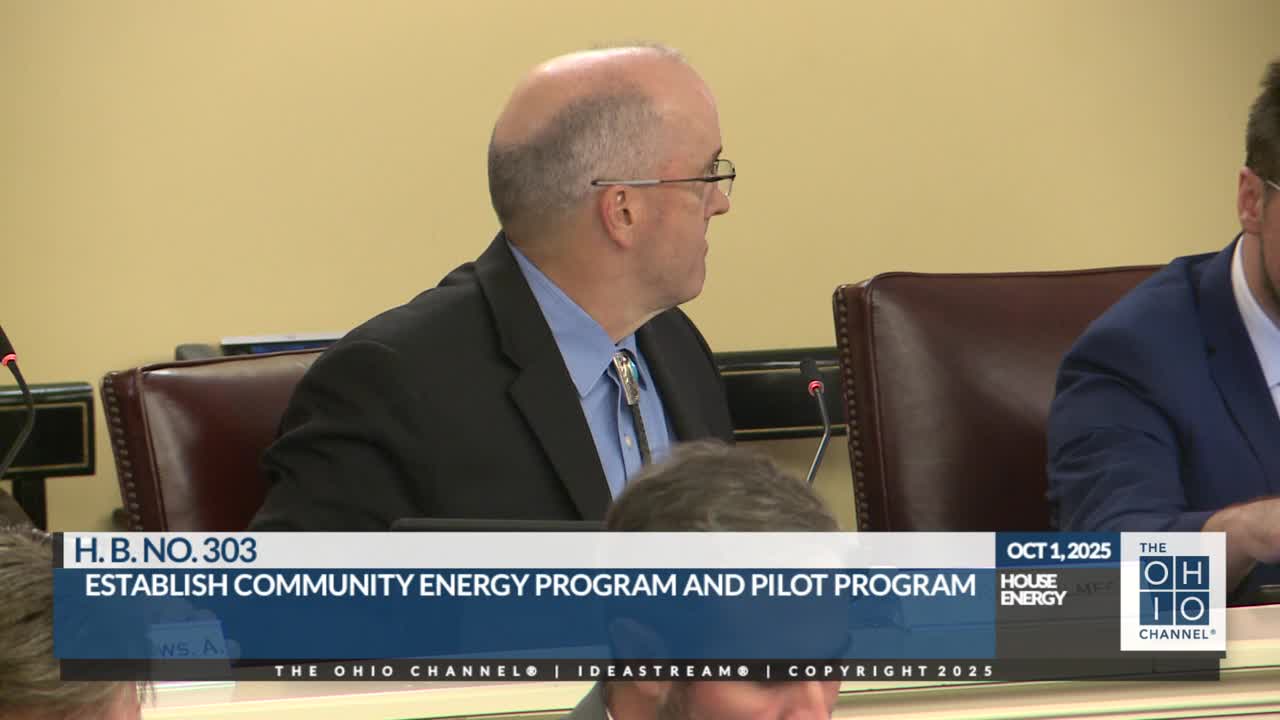House Energy Committee hears broad proponent testimony for HB 303 community energy pilot
Get AI-powered insights, summaries, and transcripts
Subscribe
Summary
The Ohio House Energy Committee heard multiple hours of proponent testimony on House Bill 303 on the distribution‑connected community energy pilot program, with developers, trade groups, environmental advocates, labor and local organizers describing the bill as a way to add generation quickly, lower subscribers’ bills and bring private investment into local communities.
The Ohio House Energy Committee heard multiple hours of proponent testimony on House Bill 303 on the distribution-connected community energy pilot program, with developers, trade groups, environmental advocates, labor and local organizers describing the bill as a way to add generation quickly, lower subscribers’ bills and bring private investment into local communities.
Carlo Caballero, new markets director for the trade association CCSA, told the committee the bill establishes a pilot that would allow distributed generation to “plug directly into the distribution grid” and said the program is capped at 1,500 megawatts (1,000 megawatts for open‑lands development and 500 megawatts reserved for distressed sites, brownfields and commercial rooftops). “Community energy saves customers money with no mandates,” Caballero said, adding that the projects operate under a subscription model and do not require direct subsidies.
The bill’s backers emphasized a package of consumer protections included in the draft: guaranteed savings for subscribers, standardized disclosures, no upfront costs or credit checks for subscribers, portability within an electric distribution utility (EDU) territory, and no early termination fees. Nolan Rutschland, managing director of energy policy for the Ohio Environmental Council Action Fund, highlighted the requirement that at least 60 percent of each project be reserved for small subscriptions (40 kilowatts or less) to enable renters, small businesses and low‑income households to participate.
Developers and investors told lawmakers the projects can be built faster than many transmission‑connected resources. Caroline Belmont of Turning Point Energy estimated many distributed projects could be online in “within a year or two” and cited examples where distributed projects deployed in months rather than years. Scott Elias, director of policy and market development at CleanCapital, said developers commonly build distribution‑connected projects in about 18 months and that private capital — not ratepayer funds — would be used to finance them.
Committee members repeatedly raised the “cost‑shift” concern — whether nonparticipating ratepayers would pay higher costs as subscribers receive bill credits. Witnesses pointed to the bill’s compensation design (a bill credit that values avoided generation and transmission rather than full retail compensation) and to analyses they say show net benefits when avoided transmission costs and local grid upgrades are considered. Elias said developers bear project risks and provide many of the upfront distribution upgrades, which in his view delivers wider community benefits.
Several witnesses described decommissioning and local control provisions. Elias and other developers said projects would include decommissioning bonds or financial assurance calculated by independent engineers and included in project contracts. The bill also retains local permitting authority: municipal and township trustees participate in permitting and trustees’ input is required for siting decisions. The bill’s current draft also narrows subscriber eligibility so subscribers must be in the same county or a contiguous county to the project, rather than simply inside the same utility service territory.
Supporters stressed local economic benefits. Carlo Caballero and other witnesses cited reports estimating billions in local economic impact and said the projects would produce lease income for landowners (including farms), create tax revenue for local governments, and create construction and maintenance jobs. Aaron Brown of the International Brotherhood of Electrical Workers said the bill would create steady work for electricians, apprenticeships and long‑term maintenance jobs.
Opposition had not presented testimony during the committee’s session covered in the transcript; committee members asked questions focused on quantifying potential impacts to nonparticipants, the mechanics of guaranteed savings, timeline and interconnection costs, and whether federal subsidy changes (for example, changes to the investment tax credit) would materially affect project economics. Witnesses acknowledged those uncertainties, saying project economics vary by site and that interconnection upgrades can make some sites uneconomic.
The committee treated HB 303 as a pilot: supporters said the cap and the PUCO stakeholder process to set tariffs and oversight will allow the program to be measured and adjusted. Several witnesses asked the committee to minimize local barriers that would effectively block small distribution projects, while also preserving appropriate oversight for larger transmission‑connected projects.
Proponents repeatedly emphasized the bill is technology neutral and open to any resource that can demonstrate cost effectiveness and reliability; witnesses named solar, battery storage and other distributed resources as likely candidates.
The second hearing concluded with no formal committee vote recorded in the transcript; committee members said they will review the bill language and stakeholder input in the coming days.
